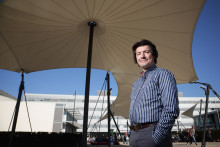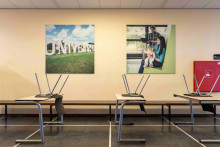Boucherie and his group have been working on healthcare logistics for many years, creating models to optimize logistical processes in hospitals and homecare. Knowledge that became particularly relevant once the COVID-19 pandemic began and the healthcare sector was stretched to its limits.
‘At the very start, we decided to relocate all our capacity and fully focus on issues caused by the corona crisis,’ says the scientist. ‘We put together a team and offered our expertise to hospitals in our network. The last two months have been extremely busy for us, but it’s great to see that our results our helping. That is what drives us.’
the team
In March, Richard Boucherie and Erwin Hans (Professor of Operations Management in Healthcare) have put together a UT team focused on helping the healthcare sector with logistical issues during the corona pandemic. The group consists of researchers from the Center for Healthcare Operations Improvement and Research (CHOIR), a multidisciplinary research centre that is a joint initiative of the EEMCS and BMS faculties of the University of Twente.
The team has closely collaborated with several hospitals across the Netherlands, helping them navigate through the pandemic. They have developed models that show how many patients can be expected (and accepted) at COVID-19 Intensive Care Units (ICU) and other wards in the coming days. ‘We developed software that may be adapted to be used for each individual hospital, depending on their situation,’ clarifies Boucherie. ‘Some needed ICU planning due to many COVID-19 patients, others focused on restarting their elective care. Our models aim to optimize the whole chain of interrelated departments, and to maximize the total capacity available for care.’
Keeping distance
The mentioned prediction models have been put to a good use, but now healthcare is facing yet another unprecedented challenge: the 1,5 meters distancing rule. ‘This means that we need to drastically reduce the number of patients simultaneously present in hospitals. We need to completely rethink how we organize care,’ says Boucherie. ‘We continue to collaborate with hospitals and homecare professionals. We focus on how to deliver treatment to patients in the hospital under this reduced capacity and deliver the care our society needs.’
'We can help hospitals to develop a strategy for a well-balanced restart'
On top of the distancing rule, the hospitals – and the researchers – need to take another issue into account. ‘There is a huge backlog in healthcare,’ says the UT professor. ‘Because of COVID-19, hospitals were not working as usual. They paused a considerable part of their elective care, but a large part of those patients need to be treated in the future as well. It will be a while before healthcare recovers from this backlog. We can help hospitals to develop a strategy for a well-balanced restart.’
‘A lot of work to be done’
The corona crisis made one thing clear, thinks Boucherie. ‘Logistics in healthcare can be improved a lot. That became even more evident now. The issue doesn’t lie in the medical quality of care, but in the organization of the logistical processes. Hospitals are more aware of this now. There is still a lot of work to be done in the next years.’
Boucherie and his team are happy to contribute to this. ‘We have had a lot to do since March but it is great to see that the processes in hospitals are improving, that we are helping. When I suggested our team members to pause their regular projects, everyone immediately agreed. We have a great team. It’s all about people in the end, isn’t it? That is what the university is about: people helping other people. I’m glad we can do that.’









